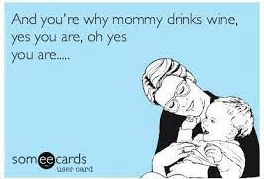The NIAAA describes the differences in impact faced by men and women who drink alcohol. While mostly biological, the NIAAA mentions in passing that women “are more vulnerable than men to alcohol-related… interpersonal difficulties.”
 “Interpersonal difficulties? I thought my friends and I gathering around with our “mommy juice” in our very own “sippy cups” was considered a social victory! I get to unwind with my friends after an insane day of parenting small children and/or working and speak to someone who understands English at a level that exceeds that of a toddler. What could be so bad about that interpersonal climate?”
“Interpersonal difficulties? I thought my friends and I gathering around with our “mommy juice” in our very own “sippy cups” was considered a social victory! I get to unwind with my friends after an insane day of parenting small children and/or working and speak to someone who understands English at a level that exceeds that of a toddler. What could be so bad about that interpersonal climate?”
I can almost hear the bank vault filling up in the fancy headquarters of the Mommy Juice brand(s). As a woman, I do understand the expectation to join what my favorite author, podcaster and television writer, Karen Kilgariff, describes as “The Cult of Perfection.” I can sympathize with the stress that mothers must be enduring. The cult has strict rules and is quick to ostracize, and, in true cult fashion, demands that women prioritize following the rules over acknowledging the possible detriment to their own children.
According to Dr. Koob, NIAAA Director, women are motivated to drink alcohol by negative reinforcement (removing something negative to strengthen a behavior, such as the stress of being a perfect mother), while men are motivated by positive reinforcement (adding something positive to strengthen a behavior- read “sporting event”).
Prioritizing this stress relief means that, whether or not they know it, women may be friendly with justifying their drinking despite its impact on their children. There is always the possibility that they will become an alcohol-dependent mother, a serious consequence for their child. Children of alcoholic mothers face a barrage of emotional trauma, can feel isolated, and, as Ann Dowsett Johnston describes in her book “Drink,” can feel unprepared for life without the support of a non-alcoholic mother. These children may even turn to alcohol to calm these traumas later in life, possibly repeating their mothers’ patterns.
its impact on their children. There is always the possibility that they will become an alcohol-dependent mother, a serious consequence for their child. Children of alcoholic mothers face a barrage of emotional trauma, can feel isolated, and, as Ann Dowsett Johnston describes in her book “Drink,” can feel unprepared for life without the support of a non-alcoholic mother. These children may even turn to alcohol to calm these traumas later in life, possibly repeating their mothers’ patterns.
In the case that the mother does not become dependent on alcohol as a result of too-regular Mommy Juice break, there are other consequences for children of mothers who drink. DrinkAware of the UK published an article about the effects on children when parents drink. “DrinkAware’s new research suggests a strong link between the frequency of young people’s underage drinking and their exposure to drinking at home.” Sue Atkins, parenting expert, writer, speaker, broadcaster, coach and author, suggests that “parents should hide their own alcohol consumption from their kids,” and try to set a good example of moderate drinking behavior for their children.

While Atkins’s advice is sound, perceptions of “moderate” drinking have been altered by commercial and lifestyle advertising from what I like to call “Big Alcohol”, an industry that capitalizes on women as nothing more than an untapped market. Memes, influencers, and bottle packaging are the insidious advertisements that encroach on mothers’ senses of “moderate” drinking, glamorizing a standing playdate with Mommy Juice. Moms on social media end up doing some of the industry’s best advertising at little to no cost.
As a world full of social media content develops before us, I wonder how future children will feel about the “vintage” 2010s memes about Mommy Juice.
 Guilty that they were so difficult to parent that their mothers spent years in rehab? Comfortable with the idea that drinking is for parents, perpetuating the cycle of parental alcohol use disorders? Confused about why the 2010s was a decade full of mothers turning to alcohol in a comfortably sassy advertising climate? This future holds a whole new host of adolescent trauma.
Guilty that they were so difficult to parent that their mothers spent years in rehab? Comfortable with the idea that drinking is for parents, perpetuating the cycle of parental alcohol use disorders? Confused about why the 2010s was a decade full of mothers turning to alcohol in a comfortably sassy advertising climate? This future holds a whole new host of adolescent trauma.
At face value, the memes we see daily about drinking the Mommy Juice, the Kool-Aid for moms trying to keep up with the Cult of Perfection, are simply funny. However, housed forever on the Internet will be a Mommy Juice museum for future generations to examine their role as mommy’s reason to turn to irregular drinking.

Very good point bringing up the potential impact of the “mommy juice” drinking era on the children of these mothers who rely on alcohol to de-stress. It’s not sending a very healthy message to the children is it? Aside from possible feelings of guilt over supposedly driving their mothers to drink, it sends a clear message that alcohol is a tool to be used and relied on when the stresses of life become to great. What kind of coping mechanism is that to pass on to our children?